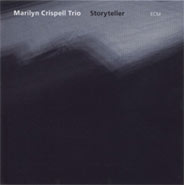Marilyn Crispell Trio
Storyteller
(ECM)
Though my album collection already included some titles that featured
her contribution, it was only in 1981, with the release of the double
album by Anthony Braxton titled Composition 98 (an album whose instrumentation
- three wind instruments and a piano - was strange indeed for what was
nominally still considered a "jazz" album) that I began to
really take notice of Marilyn
Crispell. The story that followed is quite well-known, with Crispell's
piano being an integral part of the line-up of the Anthony Braxton Quartet
that - starting from the mid-80s, and for many years - recorded so many
brilliant and important chapters in modern jazz. Parallel to this, she
recorded quite a few good albums which showed her influences, above
all John Coltrane and Cecil Taylor; hence, her torrential expression,
her love of wide canvases. Though it's obviously a subjective opinion,
from this period I'd suggest the album titled Live In San Francisco, released
in 1990.
The
following decade saw Marilyn Crispell gradually change her way of being
intense: fewer notes, more silence, a kind of breathing that maybe caught
most listeners by surprise. A process that was also apparent in two
beautiful recording sessions that maybe on paper weren't the most favourable
for this approach: the quartet with Evan Parker, Barry Guy and Paul
Lytton called After Appleby (2000), and the trio with Guy and Lytton
featured on Odyssey (2002).
The
most recent chapter in the story is Storyteller, a trio recording. The
drummer is the inimitable Paul Motian - a logical choice, in a way,
if we think about the almost Paul Bley-like silences and the similarity
with certain traits by Bill Evans that seem so well represented in her
more recent production. A musician whose career has been artistically
noteworthy for about half a century, Motian brings to the table a dialogic concept of the drums which stresses and suggests melodic developments
on cymbals and snare (just listen to the first seconds of Wild Rose,
the Crispell composition which opens the record, before the double bass
entrance); a concept where swing is often implied, rarely (Play, Cosmology
1) stated. Motian brings also six past compositions, all featuring an
original mix of the accessible and the sophisticated (just listen to
Flight Of The Bluejay). The bass player here is Mark Helias, whose work
is well-known since the days when he played with the quartet of pianist
Anthony Davis, at the end of the 70s. Dealing with a drummer who often
plays "against" the melody, Helias works as a brilliant rhythm
section and as a sensible melodic counterpoint. Limbo and Harmonic Line,
his compositions here, are quite beautiful - check the latter's simple
and intriguing melody. The leader offers three meditative compositions,
all played with the same thoughtful attention she gives to her sidemen's
contributions.
An
excellent album, very well recorded, not at all difficult to listen
to, Storyteller is the kind of album that makes me wonder about the
real reasons why Crispell's name is not well-known.
Beppe Colli
© Beppe Colli 2004
CloudsandClocks.net | Sept. 14, 2004











